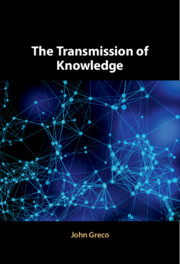Book contents
- The Transmission of Knowledge
- The Transmission of Knowledge
- Copyright page
- Contents
- Preface
- Acknowledgments
- 1 Introduction
- 2 The Framework Presented
- 3 Joint Agency and the Role of Trust in Testimonial Knowledge
- 4 Social Norms and Social Sensibilities
- 5 A Unified Account of Generation and Transmission
- 6 The Framework Extended
- 7 Education and the Transmission of Understanding
- 8 Reductionism and Big Science
- 9 Social Religious Epistemology
- Appendix: The Garbage Problem
- Bibliography
- Index
9 - Social Religious Epistemology
Published online by Cambridge University Press: 21 August 2020
- The Transmission of Knowledge
- The Transmission of Knowledge
- Copyright page
- Contents
- Preface
- Acknowledgments
- 1 Introduction
- 2 The Framework Presented
- 3 Joint Agency and the Role of Trust in Testimonial Knowledge
- 4 Social Norms and Social Sensibilities
- 5 A Unified Account of Generation and Transmission
- 6 The Framework Extended
- 7 Education and the Transmission of Understanding
- 8 Reductionism and Big Science
- 9 Social Religious Epistemology
- Appendix: The Garbage Problem
- Bibliography
- Index
Summary
Chapter 9 argues for a “social turn” in the philosophy of religion, by showing how the information economy framework can be fruitfully applied to several perennial issues in religious epistemology, including the problem of religious disagreement, Hume’s critique of testimonial evidence for miracles, and the problem of divine hiddenness. More generally, the chapter argues, contemporary epistemology of religion assumes an overly individualistic account of knowledge and justification, including reductionist accounts of testimonial knowledge and evidence. By adopting recent advances in the epistemology of testimony and in social epistemology more generally, a social religious epistemology promises to enrich and expand the field.
- Type
- Chapter
- Information
- The Transmission of Knowledge , pp. 161 - 184Publisher: Cambridge University PressPrint publication year: 2020

